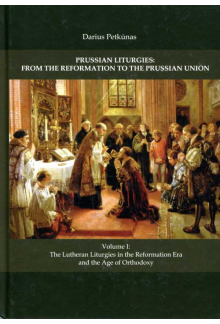- Titulinis
- Dalykinė ir mokslinė literatūra
- Humanitarinių mokslų knygos
- Teologija
- Prussian Liturgies: From the Reformation to the Prussian Union. Volume I
Prussian Liturgies: From the Reformation to the Prussian Union. Volume I
Autorius : Darius Petkūnas
Leidimo metai: 2020
Puslapių skaičius: 715
Leidinio kalba: Anglų
Formatas: Kieti viršeliai
This is the first of a four-volume study which presents to the reader the story of the origins and development of the Prussian liturgy from its earliest begin-nings in the Reformation through the age of Orthodoxy.
The Prussian Lutheran Church and its liturgies have proved to be unique in many respects. Prussia was the first land to become a Lutheran state, and in 1525 it established the first official Lutheran liturgy as a sign of the Lutheran confes¬sion of the clergy and the people. All this happened five years before the Luther¬an theologians and princes appeared before Emperor Charles V at Augsburg to present the Augsburg Confession, the document which officially marked the begin¬ning of the separate existence of the Lutheran Church. When the personal union of Brandenburg and Prussia grew into the Kingdom of Prussia incorporating vast geographical territories, it came to encompass a rich variety of unique and sig¬nificant Lutheran liturgies and associated customs and traditions. The Treaty of Vienna of 1815 brought Wittenberg itself, the heartland of the Lutheran Reforma¬tion, into Prussia. In the course of time, the Prussian Church came to be the largest Lutheran Church in Germany and indeed in the world.
However, within a few years this church would be stripped of its Lutheran identity. 1817, 1830, and 1834 were marked by royal decrees which stripped Lutheranism of its de jure status as the Lutheran Church, denied the church its proper name, and forcefully deprived it of agendas which clearly espoused its Lutheran heritage.
By means of an examination of the liturgies of the Prussian Church, this four-volume study will trace the history of the church's worship and life. It will examine the beginnings of the Reformation in the Prussian territories through an examination of its liturgies, and it will trace liturgical developments through the ensuing centuries, as well as delineate the decisive nineteenth-century develop-ments by which Friedrich Wilhelm III, a member of the Reformed Church, estab¬lished the Prussian Union and its liturgical agenda. It relates the story of Lutheran accommodation to these developments and the eventual loss of Lutheran identity in Prussian Lutheranism.
The author wishes to thank posthumously the Rev. Dr. Charles Evanson for-merly of Concordia Theological Seminary, Fort Wayne, Indiana, for many hours of fruitful discussions and valuable advice in the preparation of this study. Thanks are due also to the Rev. Daniel Johnson for his careful review of the manuscript and valuable suggestions concerning proper English usage.

